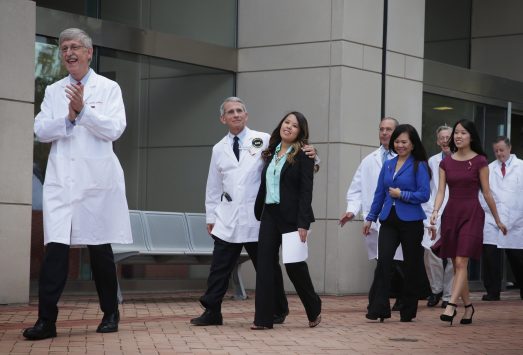Dr. Anthony Fauci, the director of the National Institute of Allergy and Infectious Diseases and chief medical adviser to the president, has been working for nearly two years to help end the COVID-19 pandemic — even directly treating patients with the disease.
But Dr. Mehmet Oz, who has criticized Fauci’s public guidance during the pandemic and called for him to resign, falsely claimed that “Fauci’s never taken care of patients,” while suggesting that Fauci does not approach COVID-19 from the perspective of “patient care.”
“Of course, try to prevent illness but have a strategy, a backup plan,” Oz said in a Jan. 24 Fox News interview, as he discussed what he perceived as a lack of emphasis on using therapeutics to treat COVID-19. “Fauci’s never taken care of patients. He’s a virologist. He works in test tubes. And so, there’s no approach to patient care, the ministering of people who are ill that’s required and that’s where you need leadership and it’s not been there.”
Oz, a heart surgeon who previously hosted his own eponymous TV show, is running as a Republican for the Pennsylvania U.S. Senate seat currently held by Republican Sen. Pat Toomey, who is not seeking reelection in 2022.
We reached out to Oz’s campaign to ask what evidence he had that “Fauci’s never taken care of patients,” but we didn’t hear back.
However, in a statement emailed to FactCheck.org, the NIAID rebutted Oz’s claims about Fauci.
“Dr. Fauci is currently a senior attending physician at the National Institutes of Health Clinical Center where he has been seeing patients continually for the past 54 years since his infectious diseases fellowship that began in 1968,” the NIAID said. “He has seen, consulted on and/or personally taken care of literally thousands of patients over the years at the NIH Clinical Center. He has never stopped seeing patients, and he still makes regular Clinical Rounds at the NIH Clinical Center, including COVID-19 patients.”
“He is not just a ‘virologist,'” the NIAID statement continued. “[R]ather he is an immunologist/infectious diseases expert who is board certified by the American Board of Internal Medicine, the American Board of Infectious Diseases and the American Board of Allergy and Immunology. He is internationally recognized for his basic and clinical research contributions to HIV and other areas of human health.”

Fauci has previously talked about making time to treat patients, including in a November 2020 interview with the HuffPost. He said that his long workday on Thanksgiving eve that year included many meetings and press interviews, but also making rounds at the NIH Clinical Center in Bethesda, Maryland, to see “two very seriously ill COVID patients.”
When Economic Club of Washington, D.C., President David Rubenstein asked Fauci in a January 2021 interview why he was still seeing patients, Fauci said it was because it is part of who he is as a physician.
“I see patients, David, because my identity, my primary identity, is as a physician and that really informs and influences everything that I do,” Fauci explained. “My public health work, my basic scientific work, the kinds of things I do in response as a public health person to an outbreak — whether that’s HIV/AIDS or Ebola or Zika or in this case, COVID-19 — everything evolves back to my identity as a physician. So, I don’t ever want to lose that strong identity.”
“It really connects you with the reality of what you’re dealing with,” Fauci went on to say. “So, when I start talking about the disease, what it can do, what you can do to prevent getting it, why vaccines are important, the very fact that you’re dealing with a real human being who’s suffering from the disease gives you a perspective that you can’t get by reading about it.”
Fauci had made similar statements years earlier in a March 2015 interview for a Science magazine article headlined, “Why NIH’s Anthony Fauci is treating Ebola patients himself.”
“He always said to me that the most important thing to him was taking care of patients,” John Gallin, the NIH Clinical Center’s associate director, said in a December 2020 interview with the Wall Street Journal for another profile of Fauci. “He thought the privilege of helping people when they were sick was the most rewarding and the very last thing he would ever give up.”
So, Fauci has had decades of experience dealing with patients, contrary to Oz’s claim.
Editor’s note: FactCheck.org does not accept advertising. We rely on grants and individual donations from people like you. Please consider a donation. Credit card donations may be made through our “Donate” page. If you prefer to give by check, send to: FactCheck.org, Annenberg Public Policy Center, 202 S. 36th St., Philadelphia, PA 19104.